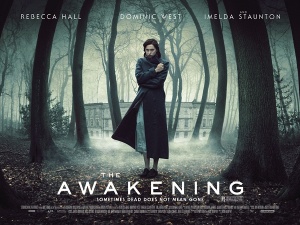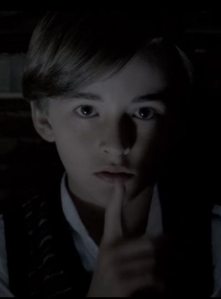From the very beginning of Nick Murphy’s period thriller, it seems that the awakening of Florence Cathcart (a plucky yet vulnerable Rebecca Hall) has already taken place. An enlightened young woman by 1920s standards, she is (Cambridge) university educated, a scientist, a published author, an inferred atheist and, most shockingly of her time, wearer of trousers while barking orders at men.
A professional myth buster, exposing fraudulent mediums feeding off the fear and grief in the aftermath of the First World War and influenza pandemic, she is called upon to investigate reported ghost sightings at a mansion turned boarding school- having been the scene of a long forgotten murder of course. Not only does she have to battle the myth and superstition of the paranormal but the prejudices of an early 19th Century patriarchal society which she does with a single-minded fervour.
However, her hardest battle is with her own sanity, which she seems to lose as the film progresses. Through a series of unexplained events and drastic, violin screeching cut-tos , the director takes us through the supposed haunted passages of the house as well as the troubled mind of Florence. Aided by a supporting cast of physically and mentally scarred war veteran turned schoolmaster, Robert Mallory (Dominic West); matron and ardent fan of Florence’s work, Maud Hill (Imelda Staunton) and frightened child (Isaac Hempstead Wright), Florence closes her eyes tightly to her previously enlightened state and awakes in a world of apparitions, superstitions and acute awareness of her own loneliness. Ironically each character’s solitude and sadness draws them closer together but leaving them more mentally isolated.
The ending to the film is far less shocking than saddening. Reminiscent of other costume thrillers, the viewer is thrown a few red herrings before being treated to a retrospective glance at explanatory scenes. The truth, once exposed, is far more jarring than the scattering of eerie moments throughout the last 100 minutes, showing that the evil perpetrated by the human mind and body is far more incomprehensible than any perceived spectral presence. This dissection and degradation of the human psyche is certainly explored in the film but is lost in a supernatural fug of ghostly set ups and thriller-by-numbers moments. The paradox, however, is that both aspects could not sustain the film on their own. Once the real horrors are known, they resolve to be one and the same, showing us that however scared we are of the darkness of the truth, we still shut our mind’s eye tight, even though this makes the truth even darker.




